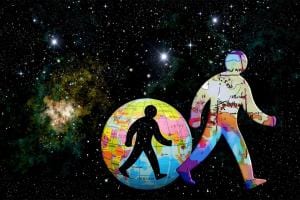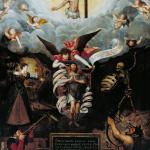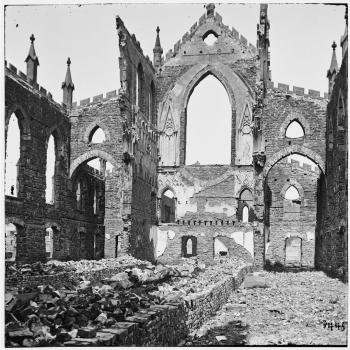
S.L. Frank, writing about society, suggests individuals cannot exist independent from society as they are abstractions based upon society itself: “Furthermore, society is the only reality in which man is given to us concretely. An individual conceived as isolated is only an abstraction.”[1] No species exists in one person, one individual alone. They always exist in groups. And they live and thrive as a group. There is no one, no human, who exists who is entirely independent or alone, and in this way, Frank is right. Individuality is an abstraction. But it is more than this. It is a false abstraction, for it suggests that a particular individual can exist all on their own. This is far from the truth, for no person exists alone, no person has an independent existence. Everything is interdependent, and society itself is a representation of the interdependence between persons:
Man lives in society not because “many” individuals “join” together, finding their mode of life most convenient for themselves, but because man in his essence is inconceivable except as a member of society – just as a leaf can only be a leaf of a whole tree or, to use Aristotle’s example, a hand or foot can exist only as a part of a whole body, as its organ.[2]
How society represents itself, how it understands itself, is not always the same. Different times and places will result in different self-representations. Society exists in the interdependent relationships between various persons, and a good society will work for the good of all those relationships. A bad society will ignore various aspects of that interdependence, losing the harmony it needs to flourish. Obviously, not everyone in a given society is the same. One person cannot just replace another. Each person is different. But all have equal dignity and should be shown equal respect, despite whatever differences exists between them. Indeed, while some people might seem to have a more important role in a given society than others, it is vital we remember the best society recognizes and respects the needs of all and sees that what often appears to be insignificant is the base and foundation by which the rest of society flourishes.
In Christian theology, the interdependent nature of humanity is recognized in a variety of ways. First, there is the unity of humanity in the “Old Adam,” in the unity of fallen humanity. Then there is the humanity of the “New Adam,” in graced humanity, designated traditionally as “the Church.” Then there is the interdependent nature of humanity, not understood in any religious sense, as it works to protect all of humanity as it finds itself in the world (both from external threats, such as the forces of nature, and with internal threats, such as unstable persons who disrupt the harmony of integral humanity). The State, in its way, is a creative engagement of the unity of humanity for that very purpose – that is, for protecting integral humanity, especially from those forces which will thrust itself upon humanity from outside itself: “In general, the State is humanity’s buttress against the external elemental forces which are acting upon it and within it.”[3]
Christianity not only teaches us that the integral nature of humanity will be restored to is pre-fallen state by Christ, but it will be deified, made greater than it existed at its inception thanks to the incarnation. All members of humanity have their place within the New Adam, the Church, even if those places differ. Paul uses a bodily image to represent this:
For just as the body is one and has many members, and all the members of the body, though many, are one body, so it is with Christ. For by one Spirit we were all baptized into one body — Jews or Greeks, slaves or free — and all were made to drink of one Spirit. For the body does not consist of one member but of many. If the foot should say, “Because I am not a hand, I do not belong to the body,” that would not make it any less a part of the body. And if the ear should say, “Because I am not an eye, I do not belong to the body,” that would not make it any less a part of the body. If the whole body were an eye, where would be the hearing? If the whole body were an ear, where would be the sense of smell? But as it is, God arranged the organs in the body, each one of them, as he chose. If all were a single organ, where would the body be? As it is, there are many parts, yet one body. The eye cannot say to the hand, “I have no need of you,” nor again the head to the feet, “I have no need of you.” On the contrary, the parts of the body which seem to be weaker are indispensable, and those parts of the body which we think less honorable we invest with the greater honor, and our unpresentable parts are treated with greater modesty, which our more presentable parts do not require. But God has so composed the body, giving the greater honor to the inferior part, that there may be no discord in the body, but that the members may have the same care for one another. If one member suffers, all suffer together; if one member is honored, all rejoice together (1 Cor. 12:12-26 RSV).
Nonetheless, we should recognize this is so because the Church represents the restoration of humanity, and so each member of humanity has a place within the whole of that humanity. By taking their place in the Church, Christians do not lose their place in humanity. They are still united with those who have not to integrate themselves with the Church. Together, they are one. That is, those who have already crossed over to restored humanity still are within the integral unity of the old Adam. For restored humanity is the same humanity as the unrestored one. It is not another humanity. It is not a new essence. It is not created ex nihilo.
Thus, Christians must recognize their place both in the Old Adam and in the New Adam. Being connected with those who have not yet taken their place in the New Adam, they will experience temptations. But, as they are a part of the New Adam, the Church, they have grace which they can use not only to resist temptation but to help those in the Old Adam also lift themselves up beyond their fallen state. To do this, Christians must act according to the gifts they have been given by becoming a member of the New Adam. They must see what they can do to help humanity, to help those still in a fallen state be engraced and revitalized in Christ. They must follow God, not just with good pious thoughts, but in deeds:
He Who knows all things says: See to it that you do not love God in a den of thieves [cf. Matt 21.13] by calling on Him amid your vanities and by invoking Him with words but not with deeds. I will respond to the person who speaks to Me with earnest words, but I keep Myself distant from those who speak to Me in rote phrases. [4]
As God is love, so humanity, created in the image and likeness of God, must reflect that love. Love acts. Christians, engaging the grace given to them, will act. They will not selfishly look after themselves and their own wants and desires; rather, they will look for the good of the whole. The common good, therefore, also promotes the particular good. The particular good must not be made into an enemy of the common good, for when it fights against the common good, it ultimately leads to its own impoverishment.
St. Basil, understanding this, also shows how the human body points to the need for communal activity, saying that by such communal work, we do better than if we try to do things as abstract individuals:
Then, too, the Lord has taught us the necessity of unity of action from the very construction of our bodies. For, when I reflect upon these limbs, that not one of them is sufficient in itself for activity, how shall I consider that I alone am strong enough to combat the troubles of life? In fact, neither could one foot move safely forward unless the other helped to support it, nor could the eye see clearly if it did not have the other as its partner, and if it did not, in harmony with it, cast its glance upon the objects to be seen. The hearing is more accurate when it receives the sounds through body channels; the grasp is stronger through the cooperation of the fingers. And, in general, I see that none of the actions performed either naturally or by inclination is accomplished without the agreement of kindred forces, since even prayer itself which does not come from persons praying together is much feebler, the Lord having declared that He will be in the midst if two or three call about Him with oneness of mind. [5]
Through sin, we cut ourselves off from the integral unity of humanity and form prideful, egotistical shells of the self which we prop up and use like avatars in the world. Sin is what tries to create such abstractions which destroy the unity of humanity. Sin tries to divide and demolish the common good. And so, when we accept the guidance of sin, we reject the common good. We lose sight of how the common good helps and promotes the greater good for everyone, including ourselves.
Pride suggests we can do all things by ourselves. We can’t. Nothing we do is done entirely by ourselves. We are lifted up by society and the structures which society have put into place. By ignoring them, we ignore who we really are. And if we try to destroy them for the sake of lifting ourselves up above everyone else, all we do is slowly destroy the ground which we walk on. When it crumbles apart, we risk falling deep into the pit of despair. Thus, St. Isidore of Seville warns us:
The proud are always taking up cause against the good ones; when prosperity shines on them, boastfully they glory in their own merits, and then they draw away from the afflictions of the good and just; but when adversities come upon them, they are turned quickly to blasphemy by the weakness of their spirit.[6]
When, thanks to wounded pride, we fall into the deep pit of despair, when we see the world and all that we thought we have accomplished, break apart, we will be tempted to strike out against others in anger. God himself will likely face our ire because we will blame him for our fall. But we must avoid do this. We must recognize our own responsibility for what we experience. We must recognize that if we cut apart the common humanity and try to be abstract individuals, we will never be able to attain the peace and satisfaction we want. Pride tells us we can cut off such relationships, rise up as individuals, and find our own godlike status all by ourselves. It lies to us, telling us we can be like god all by ourselves. Nonetheless, it is a lie which is based upon a distortion of the truth, for humanity is called to be deified, but it is called to be deified in the restored unity established by the God-man. We are called to rise up together – and to experience the glory of God together. Is this not the what we learn through communion? (cf. 1 Cor. 10:17).
The great secret of the Christian faith is the secret of the Church, the secret of the unity of humanity. Humanity is one. What is restored within that humanity becomes one within itself, as the Church, while it remains connected with the whole of humanity, working to bring the rest of humanity into the Church. And is that not what we are told will happen in the eschaton, when all shall be made one as it is handed over to the Father?
But in fact Christ has been raised from the dead, the first fruits of those who have fallen asleep. For as by a man came death, by a man has come also the resurrection of the dead. For as in Adam all die, so also in Christ shall all be made alive. But each in his own order: Christ the first fruits, then at his coming those who belong to Christ. Then comes the end, when he delivers the kingdom to God the Father after destroying every rule and every authority and power. For he must reign until he has put all his enemies under his feet. The last enemy to be destroyed is death. “For God has put all things in subjection under his feet.” But when it says, “All things are put in subjection under him,” it is plain that he is excepted who put all things under him. When all things are subjected to him, then the Son himself will also be subjected to him who put all things under him, that God may be everything to every one (1Cor. 15:20-28 RSV).
Let us, therefore, come together to pray that the Lord’s will be done, on earth as in heaven, that is, for the two to become one. Then the proper realization of the oneness of creation with God can be realized. Then God will indeed be everything to everyone as everyone one will one together with God.
[1] S.L. Frank, The Spiritual Foundations of Society. Trans. Boris Jakim (Athens, OH: Ohio University Press, 1987), 54.
[2] S.L. Frank, The Spiritual Foundations of Society, 53-4.
[3] Vladimir Soloviev, “On the Christian State and Society” in Politics, Law & Morality. Essays by V. S. Soloviev. Trans. Vladimir Wozniuk (New Haven: Yale University Press, 2000), 21.
[4] St. Hildegard of Bingen, “Letter 343” in The Letters of Hildegard of Bingen. Volume III. Trans. Joseph L Baird and Radd K Ehrman (Oxford: Oxford University Press, 2004), 134.
[5] St. Basil the Great, “Letter 97: To the Senate of Tyana” in St. Basil: Letters. Volume 1 (1-185). Trans. Agnes Clark Way (New York: Fathers of the Church, 1951), 215.
[6] St. Isidore of Seville, Sententiae. Trans. Thomas L. Knoebel (New York: Newman Press, 2018),210.
Stay in touch! Like A Little Bit of Nothing on Facebook.
If you liked what you read, please consider sharing it with your friends and family!












